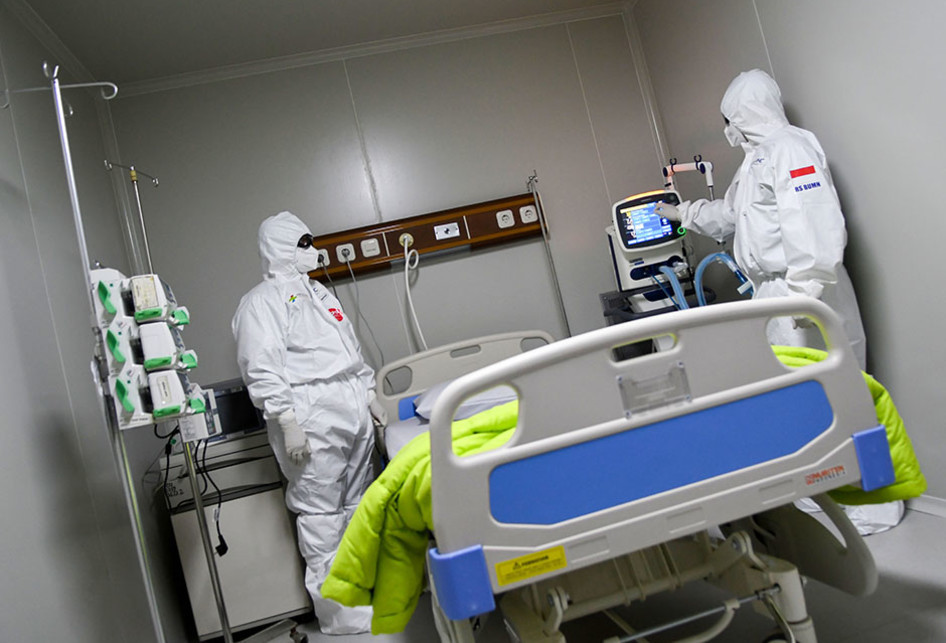Popular Reads
Top Results
Can't find what you're looking for?
View all search resultsPopular Reads
Top Results
Can't find what you're looking for?
View all search resultsOil giant Pertamina delves into health industry amid drop in fuel demand
Pertamina is in talks with state-owned pharmaceutical producer PT Kimia Farma to supply certain petrochemicals needed for drug production.
Change text size
Gift Premium Articles
to Anyone
S
tate-owned oil and gas giant Pertamina plans to explore opportunities in the pharmaceutical industry and expand its hospital business as Indonesian fossil fuel demand sinks amid the partial COVID-19 lockdowns.
Pertamina is in talks with state-owned pharmaceutical producer PT Kimia Farma to supply certain petrochemicals needed for drug production. The oil company, through a hospital subsidiary, also plans to acquire dozens of new hospitals over the year.
“We see an opportunity,” said Pertamina president director Nicke Widyawati on April 30. “What kind of business, during any crises, continues to survive or even grow? It’s medicine.”
The oil company’s dive into medicine followed a slump in fuel demand across partially locked down Indonesia. Consumption plunged 35 percent to 65,678 kiloliters (KL) per day in April from the daily average in January and February — before the country introduced a physical distancing policy requiring people to stay at home to contain the COVID-19 outbreak.
As of Tuesday, four provinces and 26 regencies/cities nationwide have implemented large-scale social restrictions (PSBB) or partial lockdowns that closed offices, factories and schools, and limited people’s movements.
Due to the falling demand, Pertamina projects its revenue — almost all of which comes from fuel sales — to fall by up to 45 percent below initial expectations under a worst-case scenario.
Pertamina spokeswoman Fajriyah Usman told The Jakarta Post on May 18 that the oil company would prepare the base ingredients for pharmaceutical production, “then either Kimia Farma or Kimia Farma with Pertamina will process the ingredients into pharmaceuticals”.
“We are still discussing the details,” Ganti Winarno, corporate secretary at Kimia Farma, told the Post on Wednesday.
Diversifying into petrochemicals is a common strategy among refiners to weather the risks of changing fuel demand. However, the global pharmaceutical market is much smaller than the global petrochemical market, noted principal analyst Darryl Xu of energy consultancy Wood Mackenzie.
Based on 2019 estimates, for example, phenol, a chemical used to produce the painkiller paracetamol, has a market over 60 times larger than that of paracetamol itself.
Xu added that while Pertamina’s plan “could prove lucrative, it only provides a tiny outlet for your volumes”.
Phenol is more widely used to produce disinfectants and plastics. Pertamina disclosed plans in April to begin the monthly production of 9,000 KL of benzene, a main ingredient in phenol. Otherwise, the oil company planned to cut production of every other product.
Pertamina also plans to convert hospital subsidiary PT Pertamina Bina Medika (Pertamedika IHC) into a holding company for 63 state-owned hospitals by December at the behest of the State-Owned Enterprises (SOE) Ministry.
SOE Minister Erick Thohir previously said the holding would eventually have 6,500 beds with an estimated revenue of Rp 5.6 trillion (US$380.9 million) and earnings before interest, tax, depreciation and amortization (EBITDA) of Rp 510 billion.
“After the establishment, total revenue could increase to Rp 8 trillion,” he said.
Consolidation began in early 2017, when former SOE minister Rini Soemarno appointed Pertamedika as holding, but the process was accelerated over the course of COVID-19.
In addition to the acquisitions, Pertamina spent Rp 130 billion on upgrading 14 of its hospitals into COVID-19 hospitals, which included acquiring two popular robot nurses nicknamed Penny and Amy.
Pertamedika owns 16 hospitals as of 2018, more than any other SOE, according to the company’s 2018 report, which is the latest available. The company is slated to acquire hospitals operated by state-owned ship operator PT Pelayaran Nasional Indonesia (Pelni) in June.










